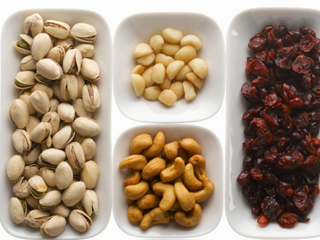By Jonnie Blaylock
 Most people today who wish to lose weight resort to paying close attention to their daily meals. First on the list of the things they avoid is fat. For many people, the assumption on nutrition is simple - if you're trying to reduce the size of your belly you should avoid eating meals that contain fat. This is not true. Although few people realize this, removing this from your diet can result in many unhealthy side effects.
Most people today who wish to lose weight resort to paying close attention to their daily meals. First on the list of the things they avoid is fat. For many people, the assumption on nutrition is simple - if you're trying to reduce the size of your belly you should avoid eating meals that contain fat. This is not true. Although few people realize this, removing this from your diet can result in many unhealthy side effects.
Just like other nutrients, our body requires a daily intake of fats in order to function effectively. Amongst many other roles, fats are required for the maintenance of our body cells and is utilized in the transmissions of signals through our nerves as well as the absorption of nutrients. Avoiding them is therefore a big mistake.
The problem with a person's dietary needs is not the fact that fat is included in a diet but more on the type that is found in the diet. Simply put there are two types of fats that can be found: good and bad fat. Like the name suggests eating meals that contain good fat is important in order to stay healthy whilst foods that contain bad types are bad and unhealthy for you sometimes resulting in heart diseases, possible cancer and annoying weight gain.
Instead of avoiding fat, a better approach to losing weight is to study and learn the differences between these two groups. By being able to recognize what these various meals are, you will be able to ensure a more balanced and healthier diet.
The Good Fats
So what are good fats? Good fats are meals which are high in unsaturated fats. These might be either monounsaturated fats or polyunsaturated fats. Monounsaturated fat is vital to healthy human growth. Its presence reduces the amount of bad cholesterol found in the body whilst increasing the levels of good cholesterol (yes there is a difference).
Regardless of the type of unsaturated fats, both provide a wide range of health benefits. Monounsaturated fats (MUFAs) lower total cholesterol and LDL cholesterol (the bad cholesterol) while increasing HDL cholesterol (the good cholesterol). Polyunsaturated fats are also found to perform similar actions.
Some good sources of polyunsaturated fats include vegetable oils and sea foods. These fats are rich in omega-3 fatty acids which greatly reduce the risk of person developing heat conditions amongst others. Sea foods such as salmon, mackerels and catfish are very rich sources of this.
Monounsaturated are just as important. They can usually be identified by their tendency to solidify when cooled. Examples of these include nuts such as cashews, walnuts, hazel nuts and peanuts. Monounsaturated fats are also very good oxidants and a rich source of vitamin E.
The Bad Fats
On the other side of the health scale are the unwanted fats. The kind known as saturated fats. It is these that are responsible for the increase of negative cholesterol levels. People who eat these types of meals will not only tend to gain fat at a much faster rate, they also will increase their risk of developing heart conditions and diseases.
Examples of saturated fats include meals such as meat, dairy, eggs and sea food. Alongside these animal products, saturated fats can also be found in plant produces such as coconut oil, eggs, meat, palm kernel and some sea foods. If you plan on losing weight or burning fat then you will need to reduce the amount of these fats that you consume. Saturated fats are dense in calories and thus provide people with fat more than they require.
There are various ways of limiting the amount of bad fats in your diet. You could substitute oils that are high in saturated fats when cooking for those that have low fat contents. Instead of using coconut oil or palm oil you can instead cook your meals with olive oil or canola oil. You should also opt for dairy product with low fat content. This will reduce the amount of unsaturated fat which you consume in your diet daily.
One way of identifying the type of cooking oil which you are using is to read the writing on the packaging. Most companies will let you know exactly what type of fats are contained within.
Finally, it is a good idea to avoid eating junk meals that have been fried or produced with saturated fats. Chips and chocolates for instance might be appealing, but they contain a high concentration of these negative fats.


No comments:
Post a Comment